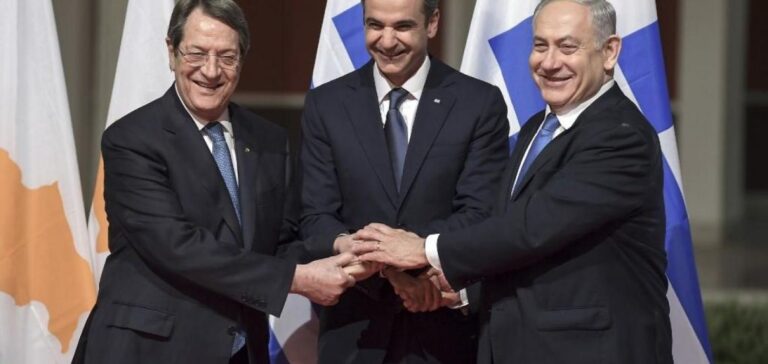Greece, Cyprus and Israel agreed on Monday to deepen their regional energy cooperation in order to facilitate exports to Europe, particularly of natural gas and renewable energies.
Mediterranean energy cooperation: A strong commitment to natural gas and renewable energies
“We agreed that the energy sector, and in particular natural gas, electricity and renewable energies, constituted a solid basis for cooperation in the region,” says a communiqué issued at the end of the meeting in Nicosia.
The statement was issued after Cypriot President Nikos Christodoulides, Israeli Prime Minister Benjamin Netanyahu and Greek Prime Minister Kyriakos Mitsotakis met for the countries’ ninth trilateral summit. The partnership between the three countries, founded eight years ago, is based on the energy wealth in the Eastern Mediterranean, particularly in natural gas, and on security of supply for Europe. Israel already has offshore gas fields, and Cyprus has untapped energy resources.
The two countries are looking at ways of joining forces to export natural gas to Europe. The three leaders said they wanted to promote “energy synergies” such as an electricity interconnection between the three countries and the possible construction of a gas pipeline, according to the joint declaration. Mr Netanyahu said that Israel and Cyprus were working to export his country’s gas reserves to Europe via the island. Nicosia is planning to build a pipeline to transfer offshore natural gas from Israel to Cyprus, where it could power power plants or be liquefied and exported by ship.
Israel, Greece and Cyprus: Crucial decisions in sight and major advances for electricity interconnection
“Decisions will be made, I think, in the next three to six months, probably closer to three months,” Netanyahu said.
Israel, Greece and Cyprus are also partners in the construction of the world’s longest and deepest 2,000-megawatt undersea power cable, the EuroAsia Interconnector, linking the three countries’ grids to continental Europe.
During the meeting of the three leaders at the presidential palace in the Cypriot capital, a demonstration took place nearby to protest against Mr. Netanyahu’s plans to reform the Israeli judicial system. Since his government unveiled its proposed reforms in January, tens of thousands of Israelis have demonstrated weekly in Tel Aviv. The next meeting of the leaders of the three countries will be held in Israel next year.
Why does it matter?
On a commercial level, this enhanced cooperation in the energy sector between Greece, Cyprus and Israel opens up new opportunities for natural gas exports to Europe. This could help to diversify Europe’s gas supply sources, strengthening its energy security. In addition, the EuroAsia Interconnector project will enable a more efficient exchange of electricity between these countries and continental Europe, promoting the integration of renewable energies into the European power grid.
However, it should be noted that this initiative also raises environmental and geopolitical concerns, particularly with regard to resources in the Eastern Mediterranean and the complex relations between these nations. It is therefore essential to monitor the development of this collaboration closely.





















